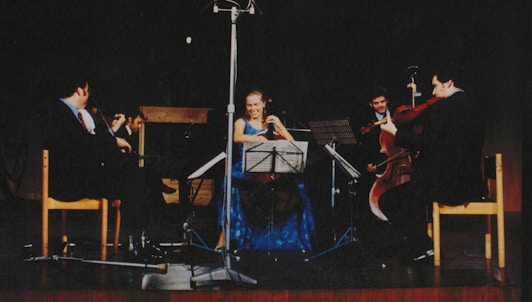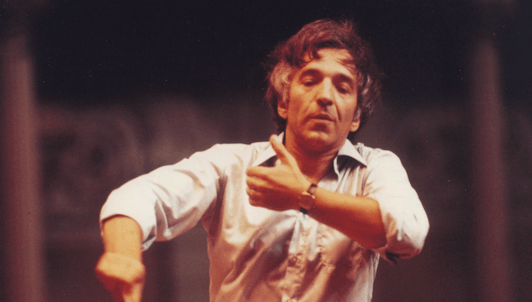Vladimir Ashkenazy plays a recital recorded by the BBC in 1987. The program includes Schubert's Impromptus D. 946 No. 1 and No. 2, Schubert's Wanderer Fantasy, Schumann's Arabesque in C Major, Op. 18 and Schumann's Piano Sonata No. 1 in F sharp Minor, Op.11.
Filmed in 1987 for the BBC's Music in Camera series, this recording captures Vladimir Ashkenazy at the piano in an unusually intimate setting. In the BBC's Glasgow studios in front of an invited audience, the great Russian-born pianist performs two program, each devoted to one composer, respectively Schumann and Schubert. The concerts present his piano artistry in his prime and reveal many of his unique qualities as a solo performer.
Ashkenazy was celebrated as a pianist long before taking up the conductor's baton. Born in Gorky (now Nizhny Novgorod) in 1937, he began lessons at the age of six and later studied at the Moscow Conservatory where his teacher was Lev Oborin. His career was launched very quickly with a cultivating of top awards: second prize at the 1955 International Chopin Competition in Warsaw, first prize at the Queen Elisabeth Music Competition in Brussels a year later and finally joint first, together with John Ogdon, at the Tchaikovsky Competition in Moscow in 1962. He entered the latter under some duress and has spoken of the way that the Soviet culture ministry, infuriated by the American pianist Van Cliburn's win at the previous contest, put extra pressure on the Russian students to take part.
It was a year later that Ashkenazy left the USSR, together with his Icelandic wife. The couple moved first to London and later Switzerland. In London during the Sixties, Ashkenazy established flourishing musical partnerships with his peers of this "golden generation," notably Daniel Barenboim, Pinchas Zukerman and Zubin Mehta. He did not return to Russia until 1989; when he did so, a camera crew went with him to document the experience.
Ashkenazy has always been blessed with an extraordinary facility for absorbing music quickly, but also a rare humility in the face of his international celebrity. In an interview few years ago, he commented: "Music is an incredible gift from God and nature. I'm only a performer and I don't have the creative genius of, for example, Bach or Shostakovich, so I feel extremely humble before them. It's my aim to be a servant to bring this music to life."
The early Romanticism of Schubert and Schumann is ideally suited to Ashkenazy's tender-hearted and self-effacing pianism. These films preserve his ever-rewarding musicianship fora new generation of music-lovers to enjoy.
Jessica Duchen



